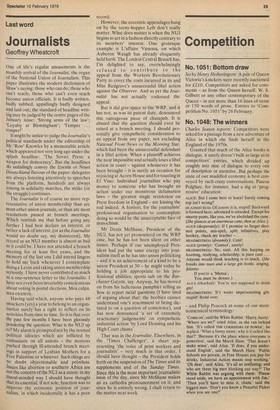Last word
Journalists
Geoffrey Wheatcroft
One of life's regular amusements is the monthly arrival of the Journalist, the organ of the National Union of Journalists. This Paper illustrates the modern declension of Shaw's saying; those who can do; those who can't teach; those who can't even teach become union officials. It is badly written, badly subbed, appallingly badly designed and laid out; the standard of headline writing may be judged by the centre pages of the January issue: 'Strong arms of the law'; 'Loyalty at Birmingham'; 'Temper . . . temper!'
It might be unfair to judge the Journalist's political standards under the editorship of Mr 'Ron' Knowles by a memorable article which appeared not very long ago under the splash headline: 'The Soviet Press: a weapon for democracy'. But the headlines do unfailingly convey the lzvestia or 'Neues Deutschland flavour of the paper: delegates are always listening attentively to speeches from the platform, hundreds are always Joining in solidarity marches, the strike (or the struggle) continues.
The Journalist is of course no more representative of union membership than are most other union journals, or than are most resolutions passed at branch meetings. Which reminds me that before going any further I had best declare an interest, or rather a lack of interest, (or as the Journalist would no doubt say, my disinterest). My record as an NUJ member is almost as bad as it could be. I have not attended a branch meeting for at least five years, and the memory of the last one I did attend lingers to hold me back whenever I contemplate doing a Levin and taking union membership seriously. I have never contributed so much as a one-sentence letter to the Journalist. I have not even been invariably conscientious about voting in postal elections. Mea culpa, rnea etcetera.
Having said which, anyone who pays 48 smackers (yes) a year to belong to an organisation surely has a right to reflect on its activities from time to time. So it is that over the past few months I have been gloomily Pondering the question: What is the NUJ up to? My alarm is prompted not by the normal Political idiocies which are inflicted by enthusiasts on all unions — the motions pushed through ill-attended branch meetings in support of Lesbian Mothers for a Free Palestine or whatever. Such things are no doubt objectionable and pointless. Issues like abortion or southern Africa are not the concern of the NUJ as a union: in my literal-minded way I should have thought that its essential, if not sole, function was to improve the economic position of journalists, in which incidentally it has a poor record.
However, the eccentric appendages hung on by the teeny-bopper Left don't really matter. What does matter is when the NUJ begins to act in a fashion directly contrary to its members' interest. One grotesque example is L'affaire Vanessa, on which Auberon Waugh has already eloquently held forth. The London Central Branch has, I'm delighted to say, overwhelmingly refused to contribute to the appeal from the Workers Revolutionary Party to cover the costs incurred in its and Miss Redgrave's unsuccessful libel action against the Observer. And as yet the Journalist has not actually endorsed the appeal.
But it did give space to the WRP, and it has not, as was its patent duty, denounced this outrageous piece of chutzpah. It is absurd that the question should even be raised at a branch meeting. I should personally give sympathetic consideration to an appeal from any paper, not excluding National Front News or the Morning Star, which had been the unsuccessful defendant in a libel action. When a plaintiff achieves the near impossible and actually loses a libel action in court — against whomever it has been brought — it is surely an occasion for rejoicing at Acorn House and for toasting in El Vino. Individual journalists who pay money to someone who has brought an action under our monstrous defamation laws — the greatest single restriction on Press freedom in England — are kissing the rod indeed. A fortiori, for the journalists' professional organisation to contemplate doing so would be the unacceptable face of masochism.
Mr Denis McShane, President of the NUJ, has not yet pronounced on the WRP case, but he has not been silent on other issues. Perhaps if our unemployed President had put the same energy into journalism itself as he has into union politicking — and it is an achievement of a kind to be a union President at 30 — he might today be holding a job appropriate to his professional abilities, sports sub on the Barchester Gazette, say. Anyway, he has moved on from his ludicruous pamphlet telling us how to report racial questions (I have tired of arguing about that: the boobies cannot understand one's resentment at being dictated to on a question of conscience), and has now denounced 'a set of extremely reactionary judgements' on sympathetic industrial action 'by Lord Denning and his High Court chums'.
That was in the Journalist. Elsewhere, in the 'Times Challenger', a sheet representing 'the voice of print workers and journalists' — very much in that order, I should have thought — the President holds forth on the suspension of The Times and its supplements and of the Sunday Times. Since this is the most important journalistic issue of the day, since Mr McShane makes an ex cathedra pronouncement on it, and since he is entirely wrong, I shall return to the matter next week.


































 Previous page
Previous page